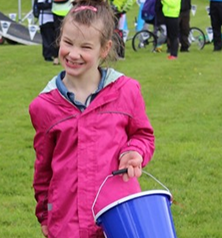“It’s a battle to get her to do half an hour of physio, but she’ll do two hours of gymnastics.”
Melissa’s mum Jennifer offers her advice on the difficult early years, why you should always be prepared for surprises, and why confidence is probably the greatest improvement to come out of therapy.
“The best advice I got from one therapist was; “We don’t know how this child is going to turn out”. It all depends on how much input they get and how they respond. The most annoying thing is that you desperately want to know how your child will turn out. However, as hard as it is, it is absolutely the best way. Just do as much as you can for your child and they will surprise you.
Melissa is kind of wobbly, she has athetoid cerebral palsy, she’s not well co-ordinated, and her balance isn’t good. But she does make herself understood. She does walk, and she does career around like a madwoman, especially if there’s a soft gym mat under her.
Advice to other parents
It is a very scary thing when you’re diagnosed but actually it’s just a different world. It’s not as bad as you might think. When Melissa was younger I’d think parents were looking at me feeling sorry for me because I had a child who was different, but there’s a lot of worse things in the world than CP and Melissa can’t imagine life without it because it’s part of her. You do just get used to things.
Going to nursery
Melissa went to mainstream school from specialist nursery. The staff in the specialist nursery worked so well I was worried about her leaving that environment. Our physio made a request for Bobath therapy in the summer holidays before she started school.
Melissa wasn’t actually walking. Her therapists asked “Can you stand?” “How long can you stand for?” Can you do this?” I think Melissa suddenly thought “Oh I’m doing a lot of things I didn’t think I could do. I think that’s what put the idea into Melissa’s head that she could walk. Two nights into the therapy we were at home and she just said “I’m going to walk” and she did, right across the living room floor. She was ready but she didn’t have the confidence.
Once she was on her feet it made everything so much easier, dressing, going to the loo, and now she can join in with different activities. She always wanted to go to a dance class, once she was on her feet she just pitched in with everybody else and then she started to go to gymnastics and different things like that.
Primary school
Melissa wasn’t continent or walking at four so she did a year in a special primary and started mainstream school a year later.
She has a specialist OT and a physio and they go into school and support the PSA and teachers to keep her on the straight and narrow and provide her with the equipment she needs.
Melissa is a sociable kid and enjoys school. Sometimes she gets left out. She’ll have friends here after school but not always get invited to other people’s houses. The parents who do have her round tend to work in the care sector – they get it. Some parents are scared, they don’t know what to make of Melissa, they worry about not being able to understand her, as it affects her speech. That’s quite difficult.
After school activities
Melissa does canoeing, gymnastics, drama and dancing. She doesn’t get wrapped in cotton wool at home. I don’t think she is ever that keen on structured therapy. It’s a battle to get her to do half an hour of physio, but she’ll do two hours of gymnastics on a Saturday and hates to miss that.
